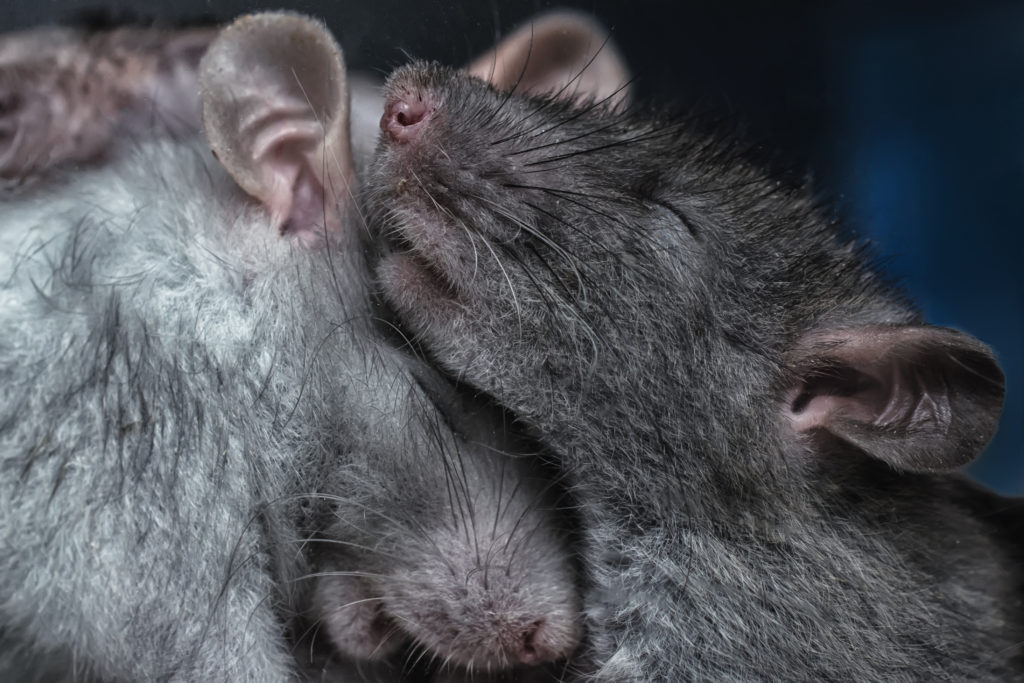Quick Hits
Daily brief research updates from the cognitive sciences

I have reported in other places on the social regions of the brain (for review see here). And this has indeed been the standard approach – try to identify the specific regions in the brain that engage in a particular activity.
However, this research adds an interesting twist to the concept of the social brain. Japanese researchers at Tohoku University and the University of Tokyo have discovered electrical brain wave patterns related to social behaviour in mice.
What did they find?
First, they found that there was a brain wave signature in social interactions. These came from regions we already know are associated with social behaviour namely a region called the medial prefrontal cortex, in the front of the brain, associated with social behaviours, and the amygdala which is well-known as an emotional and attentional centre.
When mice were socialising theta waves (slow waves) decreased and gamma (fast waves) increased. This is in itself interesting and gives another neural signature that is easier to measure than brain scanning. But mice that had poor social skills or that exhibited signs of depression or autism (yes, you can measure this in mice) lacked this brain wave pattern.
The critical question is: can these brain waves patterns actually influence social behaviour? Through optogenetics the researchers were able to stimulate the social brain wave patterns in these social dysfunctional mice and yes, their social behaviour normalised.
In short, a pretty amazing piece of research that shows that brain waves are critical to social interactions, and these can also be manipulated (in mice that is) to improve social behaviour. Not in humans yet, unfortunately!●

Andy Habermacher
Andy is author of leading brains Review, Neuroleadership, and multiple other books. He has been intensively involved in writing and research into neuroleadership and is considered one of Europe’s leading experts. He is also a well-known public speaker speaking on the brain and human behaviour.
Andy is also a masters athlete (middle distance running) and competes regularly at international competitions (and holds a few national records in his age category).
Reference
Nahoko Kuga, Reimi Abe, Kotomi Takano, Yuji Ikegaya, Takuya Sasaki.
Prefrontal-amygdalar oscillations related to social behavior in mice.
eLife, 2022; 11
DOI: 10.7554/eLife.78428
More Quick Hits
Social Interactions Define Your Sense of Purpose
Quick HitsDaily brief research updates from the cognitive sciences aving a sense of purpose is a pretty good thing to have because it seems to correlate with multiple health and life satisfaction measures. If you have a healthy sense of purpose you...
Being “Hangry” Really Is A Thing
Quick HitsDaily brief research updates from the cognitive sciences o, scientists have now proven that being “hangry” is real thing. What took them so long? Well, first of all things which seem intuitively right such as the weather making pain worse...
Reward Drives Aggressive Behaviour Against “Others”
Quick HitsDaily brief research updates from the cognitive sciences s vs. them is known as in-groups vs. out-groups in psychology. This is the well-known effect of people being loyal to their own groups and being competitive and often aggressive to...
Low Oxygen Impairs Decision-Making
Quick HitsDaily brief research updates from the cognitive sciences ast year I reported on how pollution and bad air in offices correlates with lower performance and productivity. Something business should take note of. A study out of the University...
Being Mindful Improves Relationships With Co-Workers
Quick HitsDaily brief research updates from the cognitive sciences he topic of mindfulness has been a hot topic for a number of years now. This is not to be confused with meditation which is often lumped together with mindfulness – because they do...
Engaging Leadership Boosts Employee Engagement, and Team Effectiveness, and Resilience
Quick HitsDaily brief research updates from the cognitive sciences paper just out has looked again at leadership style and impacts on employee engagement and also various team effectiveness measures. Greta Mazzetti of the University of Bologna,...






